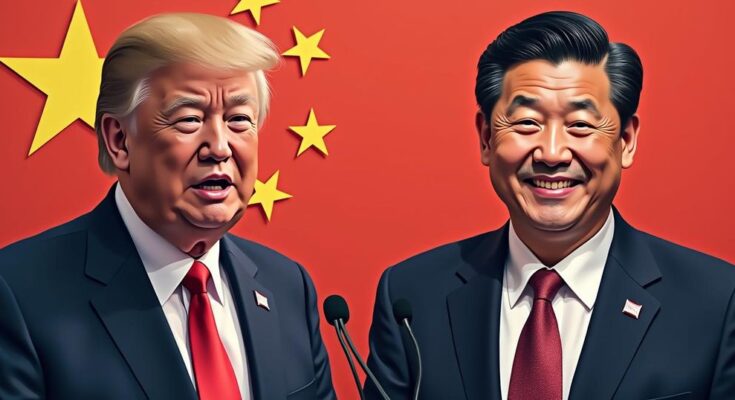Chinese citizens are closely monitoring the U.S. presidential election with apprehension about its potential implications for Sino-American relations. There is a notable preference for Donald Trump among some older individuals due to his perceived reluctance to engage in warfare, while younger demographics express tentative hope for cultural exchange and greater gender representation in leadership through Harris’s candidacy. Concerns about potential conflicts over Taiwan and trade tariffs dominate discussions, reflecting a broader desire for peace and stability between the two superpowers, regardless of who wins.
Across China, there exist anxieties and keen interests among citizens regarding the U.S. presidential election. The outcomes, whether in favor of Vice President Kamala Harris or former President Donald Trump, hold the potential to significantly affect Sino-American relations and broader world affairs. People like Mr. Xiang, a senior citizen engaged in dance classes at Ritan Park, worry about the escalations in tensions between the two nations, particularly concerning Taiwan and trade. He remarks, “None of us wants to see a war.” These sentiments are echoed among his peers, who express concerns about conflicts not only between Washington and Beijing but also regarding ongoing wars in regions such as the Middle East and Ukraine. Mr. Meng, another individual in his 70s, voices a preference for Donald Trump, citing his perceived inclination towards avoiding direct military engagement despite imposing economic sanctions on China. “…he does not wish to start or fight a war,” he commented, indicating a fear that President Biden might escalate military conflicts. This notion is reinforced by a younger demographic which expresses familiarity with Trump’s promises to swiftly end conflicts, contrasting with their views on Harris, who they perceive as aligned with Biden’s military outlook. The prevailing Chinese narrative often paints the U.S. as a provocateur in international affairs. For instance, China’s Foreign Minister Wang Yi has accused Washington of manipulating situations for its selfish gain. Concurrently, China seeks to align itself with nations in conflict zones, pushing for negotiations and ceasefire agreements, particularly in relation to the Gaza situation. Discussions surrounding Taiwan remain critical, as many Chinese individuals fear that U.S. military support could trigger a disastrous conflict. “I don’t want my son to go to the military,” laments a concerned father in the park, attributing rising tensions over Taiwan to contrasting U.S. military policies. Furthermore, when examining economic policies, Trump’s plans to impose high tariffs on Chinese goods heighten anxiety among local businesses striving for economic recovery. Many fear such measures could adversely impact not only bilateral trade but also the American populace through increased costs. “I don’t think it will do any good to the U.S. to impose tariffs on China,” expresses Mr. Xiang, encapsulating a widely held concern. Contrastingly, younger generations acknowledge admiration for elements of American culture, expressing aspirations of cultural exchange and mutual understanding. Lucy, a 17-year-old, hopes to study in the U.S., perceiving Harris’s candidacy as a positive step for women in leadership positions. In conclusion, individuals within China maintain an acute awareness of the U.S. electoral process, underpinning their aspirations for peace and stable international relations. From fears of conflict to hopes for economic collaboration, the global repercussions of the 2024 election resonate keenly within Chinese society, indicating a complex interplay of sentiment that transcends national borders.
The 2024 U.S. presidential election is viewed with considerable interest in China, where citizens are concerned about how the outcome will affect Singapore-US relations amid escalating geopolitical tensions. The stakes are particularly high given issues pertaining to Taiwan, trade disputes, and ongoing wars globally. The differing foreign policies proposed by the candidates, Vice President Kamala Harris and former President Donald Trump, shape public opinion and sentiments about potential conflicts and economic repercussions. Understanding these perspectives is vital for analyzing the broader implications of the election on global diplomacy and economic relations.
The concerns and aspirations of Chinese citizens regarding the U.S. election reveal a desire for stability and peace. As they grapple with the implications of American foreign policy, individuals express preferences that consider both the potential for conflict and the hope for collaborative engagement between the two superpowers. Ultimately, the results of the upcoming election will inevitably affect not only the U.S. and China but the global community as a whole.
Original Source: www.bbc.com




